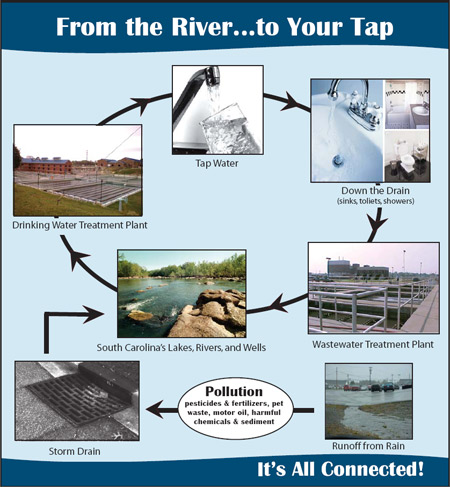The Safe Drinking Water Act (SDWA) is the federal law that regulates the quality of public drinking water. The Environmental Protection Agency (EPA) has established national health-based standards to protect residents from both natural and man-made contaminants that may be found in drinking water.
Public drinking water systems provide drinking water to approximately three-fourths (78 percent) of South Carolina residents. The South Carolina Department of Health and Environmental Control (DHEC) regulates public water systems to make sure that they meet the EPA standards. Public water systems are required to test their water frequently, treat the water if standards are not met, and notify customers of the water quality.
Our Bureau of Water tracks arsenic, atrazine, disinfection byproducts, nitrate, combined radium 226/228, Tetrachloroethylene, trichloroethylene, and uranium in public drinking water. For details regarding each contaminant please refer to EPA's Table of Regulated Drinking Water Contaminants. The Bureau of Water tracks these contaminants as part of the Centers for Disease Control and Prevention (CDC) National Environmental Public Health Tracking Network (EPHT).
Private Wells are considered private property and are not regulated by federal standards. People with private wells are responsible for testing and treating their own drinking water, and they are required to notify DHEC before installing a private drinking water well and/or irrigation well.
Take Action
 Whether your drinking water comes from a lake, river, reservoir, or groundwater, it's important to protect it from contamination. Animal waste, fertilizer, pesticides, motor oil, gasoline, and other contaminants can get carried to your drinking water source through runoff pollution.
Whether your drinking water comes from a lake, river, reservoir, or groundwater, it's important to protect it from contamination. Animal waste, fertilizer, pesticides, motor oil, gasoline, and other contaminants can get carried to your drinking water source through runoff pollution.
Do your part to help reduce runoff pollution:
- Compost or mulch yard debris and keep piles for pick-up away from storm drains,
- Use a soaker hose instead of a sprinkler to reduce runoff,
- Use pesticides, herbicides and fertilizers sparingly, use mulch as a fertilizer, and always buy environmentally safe pesticides and herbicides,
- Have your septic tank Inspected every three years and pumped out as necessary
- Properly dispose of household chemicals and hazardous waste, including medications,
- Wash your car on grass or dirt so the water filters into the ground,
- Repair leaks and dispose of used auto fluids and batteries at designated drop-off or recycling locations,
- Pick up pet waste and dispose of it properly rather than leaving it on the ground where it can wash into storm drains and local waterbodies.
Related Resources
DHEC Resources
- Understanding Your Drinking Water
- Source Water Protection
- Private Drinking Water Wells
- Protect Your Drinking Water
- Boil Water Emergencies